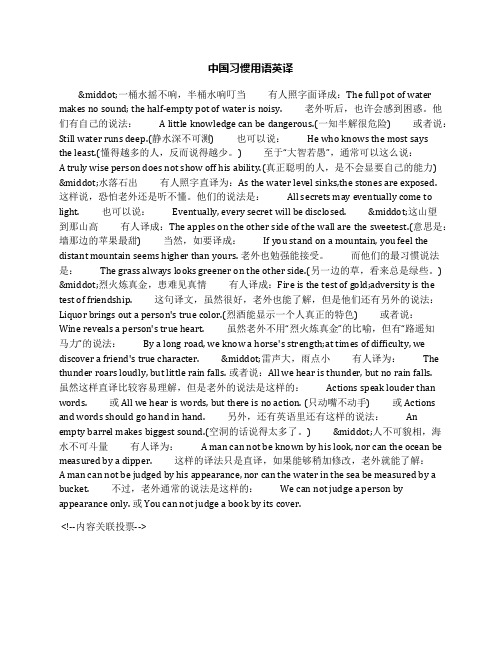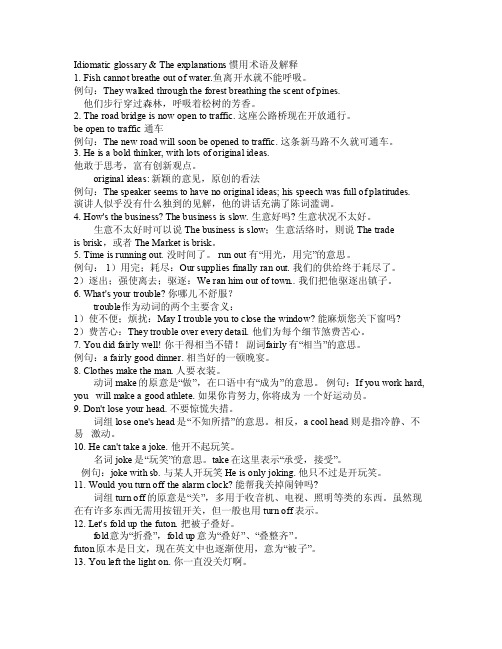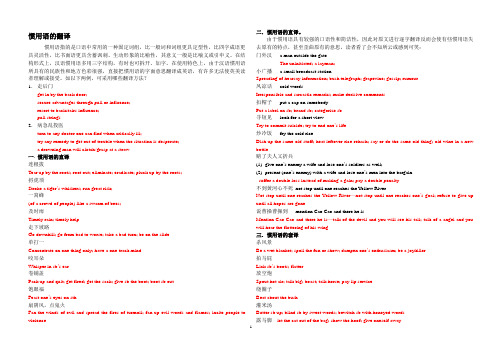汉英翻译第十讲惯用语的翻译.共20页
中国习惯用语英译

中国习惯用语英译·一桶水摇不响,半桶水响叮当有人照字面译成:The full pot of water makes no sound; the half-empty pot of water is noisy. 老外听后,也许会感到困惑。
他们有自己的说法: A little knowledge can be dangerous.(一知半解很危险) 或者说:Still water runs deep.(静水深不可测) 也可以说:He who knows the most saysthe least.(懂得越多的人,反而说得越少。
) 至于“大智若愚”,通常可以这么说:A truly wise person does not show off his ability.(真正聪明的人,是不会显要自己的能力)·水落石出有人照字直译为:As the water level sinks,the stones are exposed.这样说,恐怕老外还是听不懂。
他们的说法是:All secrets may eventually come to light. 也可以说:Eventually, every secret will be disclosed. ·这山望到那山高有人译成:The apples on the other side of the wall are the sweetest.(意思是:墙那边的苹果最甜) 当然,如要译成:If you stand on a mountain, you feel the distant mountain seems higher than yours. 老外也勉强能接受。
而他们的最习惯说法是:The grass always looks greener on the other side.(另一边的草,看来总是绿些。
中英翻译常用惯用语句.

18.这家商店开辟了休息处,受到顾客的称赞。
This department store has set up a lounge, much to the customers' appreciation。
注:英语的 resting-place 虽然有“休息处”的意 思,但更经常的是用来指“坟墓”,即“最后安息之处”。 因此,把公共场所的“休息处”译为 resting-place 不 很合适。也有人将它译为 rest-room,但那更不妥当,因 为英语中的 rest-room 是“厕所”的委婉说法,而“休 息处”不是这个意思。
14.我们这儿的人都觉得他有婚外恋。
People around here all feel that he is leading a double life。
注:affair 本身就指“私通”或“暧昧关系”,当 然是“婚外”的事,所以 outside one's own marriage 无疑是多此一举了。英语中“有婚外恋”的地道说法应该 是 lead a double life。
17.我唯一的资本就是勤奋。
My only means to success is diligence。
注:原文的“资本”是借喻,实际指“可以依靠并取 得成功的手段”。而英语的 capital 指 money ur for starting a business,并 没有中文那样的引申意思。所以,这里的“资本”不能与 capital 画等号。也有人用 advantage 来翻译“资本”, 虽然不尽意,但至少可以让读者理解。
13.别听他们胡说八道,根本就没那回事。
Don't be fooled by their babbling. Nothing of the sort。
中国习惯用语英译

中国习惯用语英译一桶水摇不响,半桶水响叮当有人照字面译成:The full pot of water makes no sound; the half-empty pot of water is noisy.老外听后,也许会感到困惑。
他们有自己的说法:A little knowledge (or learning) can be (or is) dangerous.(一知半解很危险)或者说:Still water runs deep.(静水深不可测)也可以说:He who knows the most says the least.(懂得越多的人,反而说得越少。
)至于“大智若愚”,通常可以这么说:A truly wise person does not show off his (her) ability.(真正聪明的人,是不会显要自己的能力)·水落石出有人照字直译为:As the water level sinks, the stones are exposed.这样说,恐怕老外还是听不懂。
他们的说法是:All secrets may eventually come to light. (所有秘密最后总会曝光。
)也可以说:Eventually, every secret will be disclosed.·这山望到那山高有人译成:The apples on the other side of the wall are the sweetest.(意思是:墙那边的苹果最甜)当然,如要译成:If you stand on a mountain, you feel the distant mountain seems higher than yours. 老外也勉强能接受。
而他们的最习惯说法是:The grass always looks greener on the other side.(另一边的草,看来总是绿些。
英语惯用语含义

英语惯用语含义英语惯用语含义背单词时,一定要尽快从记单个词的意思过渡到记“惯用语”的意思,因为很多英语单词的意思极度依赖周围出现的单词。
下面是店铺帮大家整理的英语惯用语含义,供大家参考借鉴,希望可以帮助到有需要的朋友。
英语惯用语含义11. It is a good athlete that never loses points.误译:从不丢分的运动员才是优秀的运动员。
应译为:再好的运动员也会丢分。
这里,“It is a +adj. + n. That + 否定句”是个习语中常出现的句型,应理解为“even if... + adj.,肯定句”,即“再……的,也会……”。
而与此结构相似的强调句型中,一般没有形容词。
2.You are not going to marry her, and that’s final.误译:你不准备同她结婚,那就算了。
应译为:你不许同她结婚,就这样定了。
“You are not going to +v.”意为“禁止你……,不许你……”。
3.The visit can’t have left us a deeper impression.误译:这次访问根本不会给我留下较为深刻的印象。
应译为:这次访问给我们留下的印象最深刻不过了。
“can’t + 形容词或副词比较级”,其实表达的是最高级的意义。
4. I can’t see you quickly enough.误译:我不可能很快见到你。
应译为:我巴不得尽快与你见面。
“cannot +adj./adv.+ enough”,意思是“越……越好”。
而另一个与此相似的句型为,“can誸+ v. +enough”,意为“非常……十分……”,如I can’t like the English teaching enough. 译为“我非常喜欢教英语”。
5. No criticism will be too severe to be gratefullyacknowledged.误译:没有一种批评会是尖锐得使人无法领谢的`。
惯用语翻译

易错习语
例04. Sir, I’d like two fired eggs. One sunny side up and the other over easy.
译:先生,我要两个荷包蛋,一个只煎 一面,另一个两面都煎一下。 注:sunny side up 字面理解为“像太阳 的一面向上”,引申为“蛋黄的一面朝 上”即指鸡蛋只煎一面。Over easy 多指 半熟的荷包蛋,即两面都煎了一下,而 蛋黄可能还能流动。
误译:他们住在一座房子里的一个宫殿 里。
正译:他们住在一座像宫殿一样的房子 里。 简析:“名词+of+名词”的句式中, 表示后一个名词具有前一名词所具有的 特征,一般可以译为“像……一样 的”“如……一般的”。
固定搭配
例03. We are but too ready to help others. 误译:我们只是太愿意而不去帮助别人的。 正译:我们非常乐意帮助别人。 简析:“too…to…”一般译为“太……而 不……”,但是当too前有其他象 only, but等副词修饰时,动词不定式意思没有被 否定,only too,but too作“十分,非常” 解。
固定搭配
例04. No one is in the world but knows the Great Wall. 误译:但是世界上没有一个人知道长城。 正译:世界上没有人不知道长城。 简析:but在此句中不是连词,它是关系代词, 用在no one或none之后,后接一个从句,but在 从句中作代词用,代替某人或某物,其含义是否 定的,从句相当于that或who引导的否定意义的 从句。因此整个句子就是双重否定,语气强于一 般肯定句,有强烈的感染力。
易错习语
例02. Half the people in my office are home sick, so I’m up to my ears. 译:我办公室里有一半的人有病 在家,所以我忙得不得了。
英语惯用语及用法

Idioma tic g lossa ry &The e xplan ation s 惯用术语及解释1. F ish c annot brea the o ut of wate r.鱼离开水就不能呼吸。
例句:The y wal ked t hroug h the fore st br eathi ng th e sce nt of pine s.他们步行穿过森林,呼吸着松树的芳香。
2. Theroadbridg e isnow o pen t o tra ffic.这座公路桥现在开放通行。
be op en to traf fic 通车例句:Thenew r oad w ill s oon b e ope ned t o tra ffic.这条新马路不久就可通车。
3. Heis aboldthink er, w ith l ots o f ori ginal idea s.他敢于思考,富有创新观点。
orig inalideas: 新颖的意见,原创的看法例句:Th e spe akerseems to h ave n o ori ginal idea s; hi s spe ech w as fu ll of plat itude s. 演讲人似乎没有什么独到的见解,他的讲话充满了陈词滥调。
4. Ho w's t he bu sines s? Th e bus iness is s low.生意好吗?生意状况不太好。
生意不太好时可以说The busi nessis sl ow;生意活络时,则说Thetradeis b risk,或者 Th e Mar ket i s bri sk。
汉语俗语英译20句

1. 她动不动就骂她的孩子们,但孩子们都知道她是刀子嘴豆腐心。
She always scolded her children, but they knew that she had a sharp tongue but a soft heart.She always scolded her children, but they knew her bark was worse than her bite.动不动: easily; frequently; at every turn动不动就感冒:catch a cold easily动不动就发脾气:be apt to lose one‟s temper; often get into a temper他动不动就训人:He is always lecturing people.刀子嘴豆腐心:have a sharp tongue but a soft heart2. 他是不到黄河不死心。
He wouldn‟t stop until he reached the Yellow River—to give up until his hope has gone.不到黄河不死心: not stop until one reaches the Huanghe River—not stop until one reaches one‟s goal;refuse to give up until all hope is gone3. 十年树木,百年树人。
It takes ten years to grow trees, but a hundred to rear/cultivate people.4. 他这一去如石沉大海,再无消息。
He left like a stone dropped into the sea and has never been heard of.石沉大海: like a stone dropped into the sea---disappear for ever; never to be seen or heard of again.5. 若要人不知,除非己莫为。
惯用语的翻译(答案)

get in by the back door;
secure advantages through pull or influence;
resort to backstairs influence;
pull strings
2.病急乱投医
turn to any doctor one can find when critically ill;
Put a label on sb; brand sb; categorize sb
寻短见look for a short view
Try to commit suicide; try to end one’s life
炒冷饭fry the cold rice
Dish up the same old stuff; heat leftover rice-rehash; say or do the same old thing; old wine in a new bottle
try any remedy to get out of trouble when the situation is desperate;
a drowning man will clutch/grasp at a straw
一.惯用语的直译
连根拔
Tear up by the roots; root out; eliminate; eradicate; pluck up by the roots;
唱对台戏
Put on a rival show; tit for tat; measure for measure; enter into rivalry
另一方面,在翻译较口语化的英语原文时,可考虑在汉语译文中适当使用口语较强的惯用语,而不应用文气十足的四字成语。
